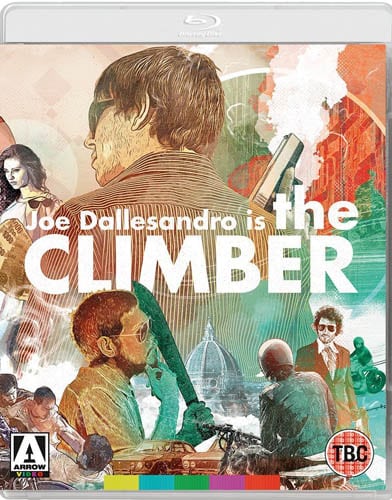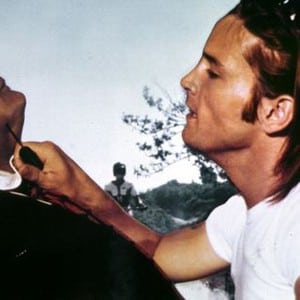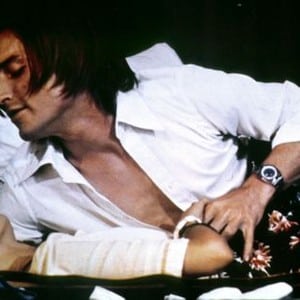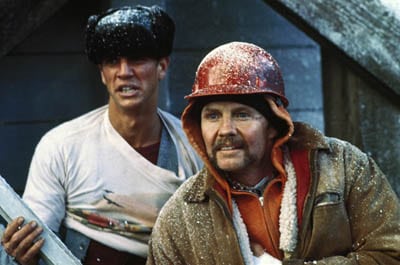The Climber
Directed by: Pasquale Squitieri
Written by: Pasquale Squitieri
Starring: Benito Artesi, Ferdinando Murolo, Joe Dallesandro, Stefania Casini
AKA L’AMBIZIOSO
Italy
ON DUAL FORMAT BLU-RAY AND DVD: NOW, from ARROW VIDEO
RUNNING TIME: 113 mins
REVIEWED BY: Dr Lenera, Official HCF Critic

Aldo lives in Naples and works in a gang which smuggles and sells black market cigarettes, but aspires to be more. When his boss Don Enrico discovers that Aldo’s been skimming some profits for himself, Aldo is beaten up and left by a road. He’s given a lift to Rome by Luciana and the two become lovers. Aldo finds an old friend and is hired to grab a suitcase containing diamonds, but discovers that it actually contains cocaine and that one of his employers has set him up to be killed once the theft of the suitcase was achieved. Aldo decides to take revenge, and sets out to claw his way to the top of the criminal underworld….
I’m quite a fan of the giallo, that odd Italian subgenre that exist somewhere between the Agatha Christie-style murder mystery and the slasher movie. However, Italian cinema in the 1970’s also saw a cycle of gangster and cop thrillers which don’t seem to be as well known outside of Italy. I’m not very familiar with them myself, aside from certain efforts like The Naples Connection which I own because I’m a fan of its director Lucio Fulci. The Climber, which is one of several similar movies from director Pasquale Squitieri, quite impressed me, though there were several occasions where I couldn’t help but think of Scarface as there are a lot of similarities between the two films, and I wondered if Brian De Palma and Oliver Stone had seen it and decided to elaborate on certain aspects, though of course the film that inspired a thousand rappers was itself a remake and these kinds of rags to riches crime tales are very common. In any case, The Climber, while not quite a neglected classic, should satisfy fans of this kind of movie, and it even has a good performance from its star Joe Dallesandro, who, despite being something of a cult favourite and a guy who undoubtedly has a kind of magnetism in front of the camera, hadn’t impressed me much as an actor previously. He’s very convincing here as the main character, mostly restrained but always seeming like he’s going to explode and exuding arrogance when he starts to rise to the top.
When the film opens, Aldo has quite a low status, perhaps unsurprisingly as, according to somebody, “his mother’s a local slut and his father was an American”. He helps bring in illegal cigarettes and then delivers them to some of the gang’s customers. Unfortunately, he’s both greedy and a little dumb. He tells his customers that the price has gone up so that he can make a little money for himself, nearly slitting the throat of one when he tries to pull a gun on him. Somebody grasses him up to his boss Don Enrico though, and Aldo is left badly beaten by a road where he’s picked up by Luciana who is on her way to Rome. We haven’t seen Aldo in a particularly good light up to now, but he seems to act the perfect gentleman in Luciana’s house….though in typical 70’s movie fashion the two end up in bed almost immediately anyway. The relationship between these two is one of the weaker aspects of the movie until the final third where it gains some weight, and it feels like it’s missing some scenes. Luciana doesn’t seem to know what Aldo does for a living, then he gives her a mysterious package [which contains cocaine] and asks her to hide it for him, which she does with no questions [!] After this, she’s firmly in the role of a gangster’s moll. Anyway, Aldo soon finds his way back into crime, grabbing a suitcase in a nice little Hitchcock-style moment at an airport, but is double crossed and is captured by the boss who was double crossed also. When he exacts his revenge, he seems to relish stabbing the guy, then seems taken over by mania as he gets a real feeling of power when he finds the names and details of all the people his victim was blackmailing.
Aldo returns to Naples in quite a powerful position, and sets about recruiting a crew to help him wrest control of the town away from Enrico. Many of them are motorbike racers, cue lots of scenes of bikes whizzing around, though my favourite was the guy credited as ‘the Frenchman’ but called on one occasion during the film Bernard. “He doesn’t work for money, he does it because he hates everyone” Aldo is told, and Bernard is a quietly sinister presence lurking throughout much of the second half of the film. Aldo gains more and more power but there’s a sense that he may bite off more than he can chew and – well, you know how he’s going to finish up, though the final scenes are nicely done with virtually all sound drowned out by the music. Do we feel sorry for him? Not really, considering how he becomes more and more dislikeable throughout, perhaps being at his most unpleasant when he forbids Luciana to leave him, then spends their next night out flirting with another woman while she’s present. The film is honest enough not to make Aldo sympathetic, but as with many of the best screen gangsters you’re compelled to keep on watching him and you’re on tender hooks as to what he’s going to do next. On the other hand Luciana is a character you begin to feel really sorry for and her journey is rather movingly acted out by Stefania Casini who throughout makes the most of what is admittedly a rather underwritten part.
Fists and bullets fly every now and again, though there’s less of the red stuff than you may expect. In fact much of the violence is handled with restraint, often taking place in partial darkness or from a distance. The pace is fairly quick though – in fact some scenes seem like they’ve had portions lopped off them – and the storyline easy to follow. Squitieri and his cinematographer Eugenio Bentivoglio give us a film which is pretty stylish looking at times, such as during the many [usually red-drenched] nightclub scenes where the camera tends to slowly pan past people’s faces. This has an effect which is both rather claustrophobic and slightly dreamlike. Long, single takes are employed throughout, like during a fight in a club, but there’s also a gritty, authentic feel to much of the piece, which looks like it’s been mostly shot on location in Naples with minimal use of sets. Humour is almost entirely absent, even of the unintended kind which does sometimes seem to turn up in these low budget, quickly shot efforts. The music score by Franco Campanini plays a major part in the film, often driving the pace forward with fierce rock or a hip-hop style beat, and sometimes providing a bit of feeling with some sadder, Michel Legrand-style pieces. One track gets some strange spoken words laid over it in one scene, and a singer who sounds a bit like Barry White is heard every now and again.
I could have done with a few more of those colourful hoods that tend to hang around in the background of these films, and in fact none of the gangsters besides Jo and Bernard make much of an impression, though they do usually tend to look the part. Portions of the screenplay seem rather rushed and it sometimes seems that pages of it have been torn out. The Climber is still a very solid film of its type though, and nowhere does it seem to glamourise crime, something which even the likes of Scarface can’t seem to help but do at times. This makes it seem perhaps a more honest effort than some of the better known pictures which tell pretty much the same story.
Rating: 









The main title sequence for The Climber must have been in pretty bad shape as it doesn’t look too good even on this new restoration, with excessive grain and bits of dirt all over the place. But things substantially improve after that – okay, many shots look rather soft but it looks like that’s the way they were shot. The level of grain is just right, blacks are deep and the rest of the colours seem accurate. I watched most of the film with its Italian soundtrack but occasionally switched over to the English dubbed option. The latter seems to be one of the better ones of its kind, the dialogue seeming reasonably natural and the voices not too silly sounding, though as usual the Italian, which is a little louder, is the way to go. There’s only one real special feature on the disc but it’s certainly a goodie. Little Joe’s Adventures in Europe sees Dallesandro talk, for a seemingly unbroken half an hour, about his post-Andy Warhol career and life on the Continent where he alternated arty pictures for adults with quickie action thrillers. The man, who begins by asking for a cigarette and then saying he feels better after it [how wonderfully politically incorrect], is very honest and open as he talks of a variety of subjects from his relationship with Casini [apparrently she left Bernardo Bertolucci for him, which really made Joe feel like he was somebody], to working on certain films [which he was sometimes conned into doing] to his alcoholism. I’d have happily listened to him for longer, and the talk is a really addition to this release of a seemingly forgotten gangster movie which deserves more exposure.
SPECIAL FEATURES
*Brand new 4K restoration of the film from the original negative
*High Definition Blu-ray (1080p) and Standard Definition DVD presentations
*Original Italian soundtrack in uncompressed PCM mono with optional newly-translated English subtitles
*Alternative English-language soundtrack with optional English subtitles for the deaf and hard-of-hearing
*Little Joe’s Adventures in Europe, a brand-new interview with Joe Dallesandro on his numerous European film appearances during the 1970s and early 1980s
*Reversible sleeve with original and newly commissioned artwork by Chris Malbon
FIRST PRESSING ONLY: Booklet featuring new writing on the film by Roberto Curti, author of Italian Crime Filmography, 1968-1980







Be the first to comment